- Home
- Cynthia Voigt
Sons From Afar Page 2
Sons From Afar Read online
Page 2
“International law, international banking law,” James’s voice said. “I think I’d be good at that.”
“I wouldn’t,” Sammy said. “I wouldn’t like something where you didn’t do anything.”
James sputtered and Sammy was afraid he’d start explaining about how important banking was, but he didn’t.
James had heard the boredom in Sammy’s voice and reminded himself that Sammy was still young, still just a kid, only twelve. “What about your homework?” he asked.
“What I don’t get done tonight I can finish on the bus.” James shrugged: Sammy just didn’t care about grades. He just didn’t know how important they were; he didn’t care about knowing things either.
“You know,” Sammy’s voice said, “it always looks like the stars are coming out, even though they aren’t.”
“They’re really suns,” James told him. He looked up at the sky then. It was black, silky black, with no moon yet so the suns burned clear out there. James picked out the constellations he knew: Orion, by his belt, he could always always find Orion; the big dipper, like a geometric figure, like a rhomboid; the little dipper, a smaller rhomboid, his eyes searched it out. Then the North Star, Polaris. The Pleiades, the sisters, crowded together, the seventh sister burning faintly. “Every one of them is a sun, a mass of burning gases. Do you know how hot the sun burns?”
“So what,” Sammy’s uninterested voice said.
“Neither do I,” James admitted. He used to know, but he’d forgotten. Sammy’s laugh sounded friendly. “Tell you a story,” James offered. “You want to hear a story?” Sammy always liked being told stories.
“Good-o.”
James identified the story’s source, first. “This is from Greek mythology. There was an inventor, named Daedalus, a famous inventor. Everybody knew about him. So when King Minos of Crete wanted a labyrinth built—a maze—where he’d keep his son, the Minotaur, in the middle—”
“I remember the Minotaur,” Sammy interrupted. “It was in my book of monsters. It was half man, half bull.”
“Yeah. So Minos hired Daedalus to design and build this labyrinth. Daedalus took his son Icarus with him to Crete. But when the job was finished, Minos kept them prisoners in a high tower.”
“Why?”
“Because they knew how to get out of the maze and Minos wanted that to be a secret. In the tower, they had to haul their food up in baskets, and they had candles for light. The only things that could get into the tower were birds. They were prisoners there for a long time. There was no way to escape, but Daedalus figured out a way. See, when the birds flew in they’d shed their feathers. So he and Icarus collected the feathers. They stuck them together with wax, to make huge wings. When they had enough—it must have taken years—they were ready to fly out, away, to fly free. Before they left, Daedalus warned Icarus that he shouldn’t fly too close to the sun, because the heat of it would melt the wax that was holding the wings together. But Icarus didn’t pay attention. Or he forgot, maybe. Because when they were out and flying, he went up, and up, until the heat was too great. His wings fell apart and he fell—he fell out of the sky into the ocean. He drowned.” James never could tell a story the way it should be told; when he told it, he could hear it sound like a series of facts, like a history book, not like a story.
“I can see why he did that,” Sammy said. “If you could really fly, you’d always want to go higher, once you started flying. Wouldn’t you?”
Not if he’d been warned against it he wouldn’t, James thought, and explained why. “He should have listened to his father. His father knew.”
“That’s an interesting story, even if the air actually gets colder as you go higher, even if they’d need more than wax. Even if—” Sammy sat up suddenly. “Okay, James, what is it? You figure that if we had a father he could tell us what we should do?”
“We have a father,” James said. Now that Sammy was willing to talk about it, and they were facing one another, James wasn’t sure he really wanted to talk. He looked over Sammy’s shoulder to the night sky.
“You know what I mean,” Sammy said. James guessed he did. “What would a father do, anyway?”
“Fathers are—like a constant,” James tried to explain. “They’re always there, they don’t change, they know how things go, they have experience, or knowledge, anyway, they’re pretty wise—so they can help you decide.”
“Not ours. Not our father.”
“You sound angry.” James thought maybe he shouldn’t have brought the subject up.
“When I think about him, I am,” Sammy said. “I mean, you don’t go around just starting babies and—ignoring them. Abandoning them. Or their mother, either.”
“That’s what our father did,” James pointed out. “We don’t know anything about him. Not anything. We should know about him.”
“We do,” Sammy’s voice insisted.
“No, we don’t. We don’t know—although, if fathers take responsibility—you know, keep you safe?—because they’re bigger and stronger like ‘my-daddy-can-beat-up-your-daddy’—and help you out of trouble.” James made himself draw the logical conclusion: “If that’s what fathers do, ours is pretty much of a bust.”
“You can say that again.”
“But maybe he didn’t have a chance, or something. We don’t know.”
“You mean maybe he died?”
“He could have. We don’t know anything about him. Nobody would even know to tell us if he was dead and couldn’t have taken care of us anyway.”
“But what difference would that make?” Sammy asked. James waited while Sammy worked it out. “Do you mean a father would be on your side? Like the Professor and Jeff, like the Professor is on Jeff’s side? Like, the way the Professor knows what Jeff means, or what he wants.”
“Or what you needed, and he’d want you to have that.”
“Do you think Momma might not have died, if we’d had one?” That thought got Sammy up onto his feet.
“I dunno about that, Sammy.” James kept emotion out of his voice. The trouble with Sammy was, when he did care, he never stopped. He cared too much. “It doesn’t do any good to think about that. You can’t change what’s happened.”
They didn’t say anything then, for a while. Sammy lay down on his back again. James moved down the dock, lifting his backside carefully to be sure not to get splinters, and tried his brother’s position. His calves dangled down over the water and the boards were uncomfortable against the shoulder bones in his back. That was the place where wings would be attached, if you had a pair of huge wings attached to you, if your father had designed a pair of wings made out of feathers and wax so you could escape. The wind flowed over the water, over the two of them, over the marsh grasses and into the pine trees. The noises of the wind rippling the water and echoing in James’s ears, the wind running along the tops of the grass and then tangling itself up in the thick-growing pines—sometimes, what really scared James was the sense that he was being blown along on some wind, and he couldn’t do anything about it.
“I thought, maybe we could try to find him. Or find out something about him,” James said.
“Why?”
“Aren’t you even curious? I mean, especially if they’re right about how much we inherit from our parents, what Mendel discovered about dominant and recessive genes—don’t you want to know?”
“No,” said Sammy.
“I do.” He wasn’t about to try to explain to Sammy how true that was.
“Well, if you do find out, don’t come telling me about it.”
James guessed he wouldn’t. He guessed he was sorry he’d even asked Sammy about it. He guessed—it was a pretty stupid thing, anyway, and impossible anyway, since none of them knew anything about their father, except Gram, who had actually met him. And he couldn’t ask Gram about his father because—she wouldn’t understand. James didn’t know what it was his grandmother wouldn’t understand, but he knew she wouldn’t understand it. Not because s
he didn’t want to, but because she couldn’t. Because she wasn’t a teenage boy who needed to have a father. Or, if he couldn’t have one, at least needed to know about the one he didn’t have. Even Sammy didn’t understand.
James sat up. He guessed the whole idea was pretty useless, so he thought he’d go take a look at the three chapters they were going to be tested on in algebra. He didn’t think there was anything he didn’t understand, but it never hurt to review. It was better to forget about his father and concentrate on his grades.
“There’s only one reason I’d ever want to find him,” Sammy said.
“Yeah? What?” James stood by his brother’s head, waiting.
“To hurt him.”
“That’s weird.” Sometimes, James just didn’t know about Sammy.
“Well, it’s true,” Sammy said.
James left Sammy to the wind-filled silence of earth and space and went alone up the path to the house. The long path from the dock to the farmhouse wound like a black ribbon. The marsh grasses spread dark and restless on both sides. The pines that grew in a mass between the marsh and the garden waited ahead, in deeper darkness. The night lay around James as dark and uneasy as his own life. James wasn’t used to dreading the school days, but because they ended in baseball practice, he did. He’d been dreading them ever since baseball practice began, in late February.
James knew why he’d gone out for baseball, but he didn’t know whether he was right in his analysis of the problem. He hated making himself run laps and do exercises; he did it, of course, but really because he was afraid of the coach noticing him and making him an object of scorn for everybody to enjoy. He knew he’d just sit on the bench all season long. In fact, he was pretty much counting on that. When he was in the outfield, playing, all he could think about was how much he hoped nothing would come his way. He didn’t like playing, or even drills; he spent all his time afraid of messing up. James had gone out for baseball because he wasn’t about to try lacrosse—and get his teeth knocked out or his bones broken, or something. He went out for baseball because he really wanted to sing with the chorus. Because only dorks sang in chorus.
That was the problem. James thought people thought he was one of the dorks—a wimp, a nerd—whatever—a jerk. A lot of the things he liked were dorky things to like—math and Shakespeare, thinking, and singing stuff like Handel’s Messiah the way the chorus did at the Christmas assembly. And he was so afraid—name it and he’d get anxious about it, war, any disease, death, people seeing how dorky he really was. He did his best, he did what he could, but what could you do when you were weak and skinny and didn’t look cool, and couldn’t ever say what you were thinking because people would think you were showing off. He’d learned how to get A’s without people minding, or labeling him a brain, without being the kind of student teachers paid special attention to. Teacher’s pet, there was the kiss of death. He knew how to say just so much, and no more, of what he was thinking. A real dork wouldn’t figure out how to do that, would he?
James had tried to think things out, figure out why, what there was about him. He knew he didn’t fit in. He was wrong, somehow, and he wanted to be all right, but it was almost as if there was some secret nobody would tell him, so he was always going to be stuck outside. For a second, the image of Celie Anderson’s face floated in front of him, but it was too painful and he pushed her away; but if he could just once, just for one second, get her to look at him as if he were a human being . . . not the way she did and had done for the two years she’d lived in town, looking through him as if he were invisible, or not even there, the way people looked at dorks. Didn’t look at them, that was more accurate.
In the denser air of the belt of pines, James admitted to himself that they might be right about him; if that was true, it wouldn’t do much good to try to change their minds. He stopped walking and let the darkness come up over him like water. He was so embarrassed about himself, so ashamed. When he thought about it, there wasn’t much he was proud of in his life. One thing was the way he’d always helped Maybeth with school, first reading and then math, too, whatever she needed. He did a good job of helping his younger sister, he knew that. He should probably be a teacher, or something, some no-money job where it didn’t matter if you were a wimp. Also, he sometimes had good ideas, like when he suggested to Gram that she rent out the acreage of the farm, so the land would earn them some money. Now the fields were planted every spring, with soybeans, and Gram and James had negotiated a deal with Mr. Hitchins, the farmer, to take some of the rent in cash in the spring, and the rest in a percentage of the net profit. So James wasn’t a total loss. He thought.
But he really didn’t understand—they’d been here for five years, now, five and a half, and all the rest of them had done all right. Even Dicey, who was the most different of all the Tillermans, had a couple of friends; Dicey didn’t care much about people, what they thought, but she had Jeff who probably wanted to marry her, and Mina, who was popular with everyone because she was such a terrific person. James figured that Dicey was probably out there at college right now, finding one or two really good friends. Maybeth, for all that she was so slow at school, which usually guaranteed unpopularity, was always getting phone calls, getting invited to parties or to do things. People liked Maybeth. She was like their Momma had been, just a good person, and when you heard her singing around the house it made the whole day better. That was another reason James couldn’t sign up for chorus, because Maybeth was in it, and nobody was as good as Maybeth. Then Sammy, who was—if anybody thought about it—almost as stubborn and cranky as Dicey; everybody thought Sammy was cool, a cool dude. He was a natural athlete, and good-looking, and he didn’t care about people so people cared about him.
Which left James. A real lunch-pail. Maybe, he thought, making his feet start moving again, knowing it did no good to hang around in the darkness thinking about himself, maybe he’d end up like Gram, the way she lived before they all dropped down on her, all the Tillermans. Maybe that was the way he’d end up living—everybody thinking he was crazy and leaving him alone—except he would go to law school and get a good job, and make money. He wasn’t the kind of person who got physical work done, he knew that, but he’d get his scholarships and his education, he’d make good money.
His father had been the kind of man who just—had these children and then disappeared, not even giving them his name, not even marrying Momma. And his grandfather, on his mother’s side, had read all of the books on the shelves in the living room, read Aristotle and Gibbon and just about everything and he’d just—stayed there on the farm, maybe trapped, but to hear Gram talk it sounded like he’d choked to death on his own life, or his own brains, or something. Gram might be weird, but she was nobody’s fool, and she had courage. James almost wished he’d gotten his grandmother’s courage instead of his grandfather’s brains.
James heard running footsteps and waited in the middle of the garden for Sammy to catch up with him. The house, a black square with light the color of melted butter pouring out of its windows, lay ahead of him. Sammy was running fast, but easily—How did the kid get the energy, James wondered.
“Good, you waited,” Sammy said. He wasn’t even breathing heavily. “I figured, we should go in together, because we went out together. Or Gram might worry.”
James hadn’t even thought of that, and he was supposed to be so smart.
“With Dicey away,” Sammy explained, “Gram does the worrying for both of them. I liked it better when they split it up, didn’t you? Sometimes they overlooked things that way.”
They walked together back to the house. Sometimes, James really liked the way Sammy saw things.
“I wish Dicey was here,” Sammy said.
“I kind of like not having her telling me how to run my life,” James admitted.
Sammy ignored that. “Anyway, how would you go about finding him, tracking him down?” he asked.
“I don’t know,” James said, as if he wasn’t interest
ed.
“Yes you do. You always have ideas. And some of them are even good ones.” Sammy seemed to catch on that James didn’t think his teasing was any too funny. He ran ahead, up the steps and into the kitchen.
James came more slowly, watching. Maybeth sat at the wooden table, reading something, a textbook, her lips moving the way they still did when the material was confusing to her, her finger pointing under the words. She looked up at Sammy, and smiled. “Hi. Where’s James?” Pretty, she was pretty, as pretty as Momma, James thought, stepping into the doorway.
“Hey,” Sammy said. “Is there anything to eat?”
“Cookies,” Maybeth told him, her voice soft and low; even when she was just talking, Maybeth sounded like she was singing. “There was a phone call for you, a girl. She didn’t leave her name. She said she’ll call back later maybe.”
“I hope she doesn’t,” Sammy answered, taking the top off the glass jar where they kept cookies. “Girls are a pain.”
James stood by the door. Those two, they’d gotten their Momma’s good looks, her golden good looks, and he’d gotten—he didn’t know what he’d gotten. He’d gotten lost and helpless and confused. He’d gotten the bad differences. No wonder he was such a dork. But maybe he would do it, anyway, maybe he would try to trace their father and find out something about him. Maybe he’d just go ahead and do it.
CHAPTER 2
James did know that they had all been born in the same place, the hospital back in Provincetown, Massachusetts, where they used to live. He sat down that night and wrote a letter to the hospital, saying who he was, the date of his birth, and who his mother was. He asked for a copy of his birth certificate. Birth certificates had both the mother’s and the father’s names on them. When he was satisfied with it, he typed up a copy of his letter on the old office-style manual typewriter Gram had gotten for them. He didn’t remember the name of the hospital, or its street address, although he had a vague memory of a building he knew was the hospital where he’d been born. He figured Provincetown was small enough so the letter would get there addressed to Provincetown Hospital, Provincetown, Mass.

 The Runner
The Runner By Any Name
By Any Name Bad Girls, Bad Girls, Whatcha Gonna Do?
Bad Girls, Bad Girls, Whatcha Gonna Do?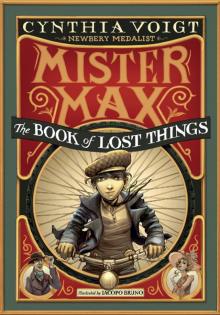 Mister Max: The Book of Lost Things: Mister Max 1
Mister Max: The Book of Lost Things: Mister Max 1 The Wings of a Falcon
The Wings of a Falcon Bad Girls in Love
Bad Girls in Love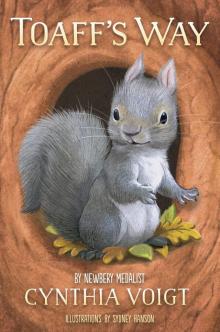 Toaff's Way
Toaff's Way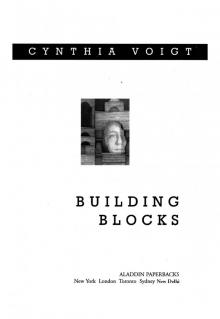 Building Blocks
Building Blocks Orfe
Orfe Tell Me if the Lovers Are Losers
Tell Me if the Lovers Are Losers It's Not Easy Being Bad
It's Not Easy Being Bad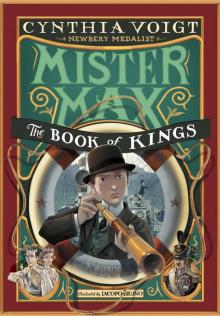 The Book of Kings
The Book of Kings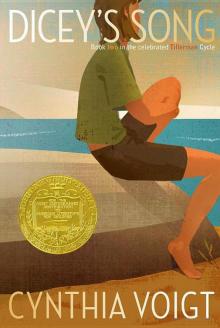 Dicey's Song
Dicey's Song A Solitary Blue
A Solitary Blue Tree by Leaf
Tree by Leaf Sons From Afar
Sons From Afar Teddy & Co.
Teddy & Co. Jackaroo
Jackaroo Elske
Elske Izzy, Willy-Nilly
Izzy, Willy-Nilly Come a Stranger
Come a Stranger Mister Max: The Book of Secrets: Mister Max 2
Mister Max: The Book of Secrets: Mister Max 2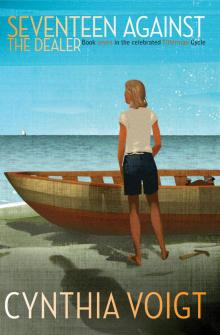 Seventeen Against the Dealer
Seventeen Against the Dealer The Callender Papers
The Callender Papers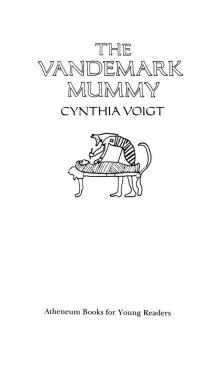 The Vandemark Mummy
The Vandemark Mummy Tale of Birle
Tale of Birle Glass Mountain
Glass Mountain The Tale of Oriel
The Tale of Oriel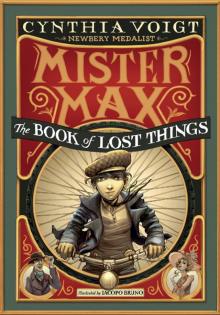 The Book of Lost Things
The Book of Lost Things The Book of Secrets
The Book of Secrets Tale of Gwyn
Tale of Gwyn